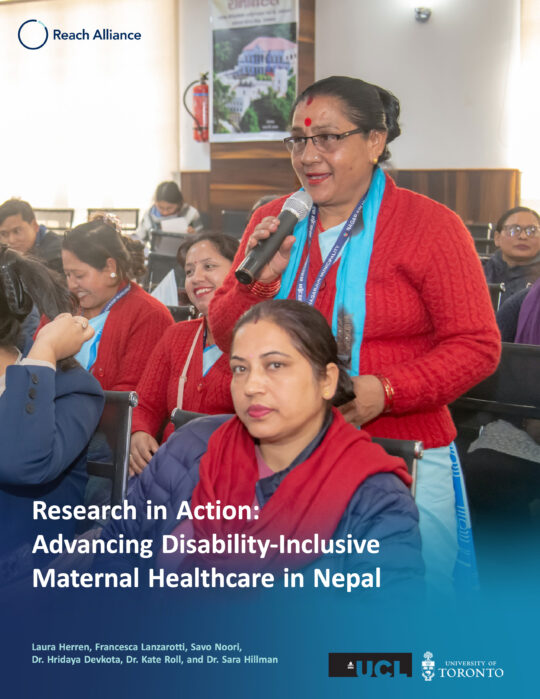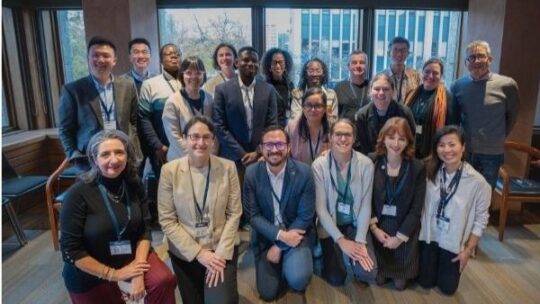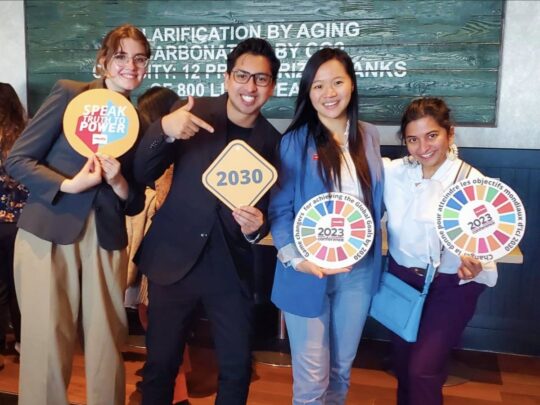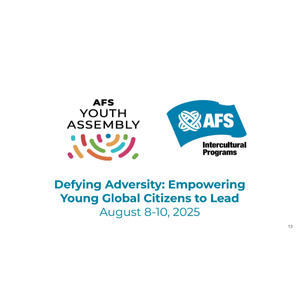News: Announcement, Latest News
Introducing eight U of T Reach research teams who are investigating local solutions to pressing global challenges
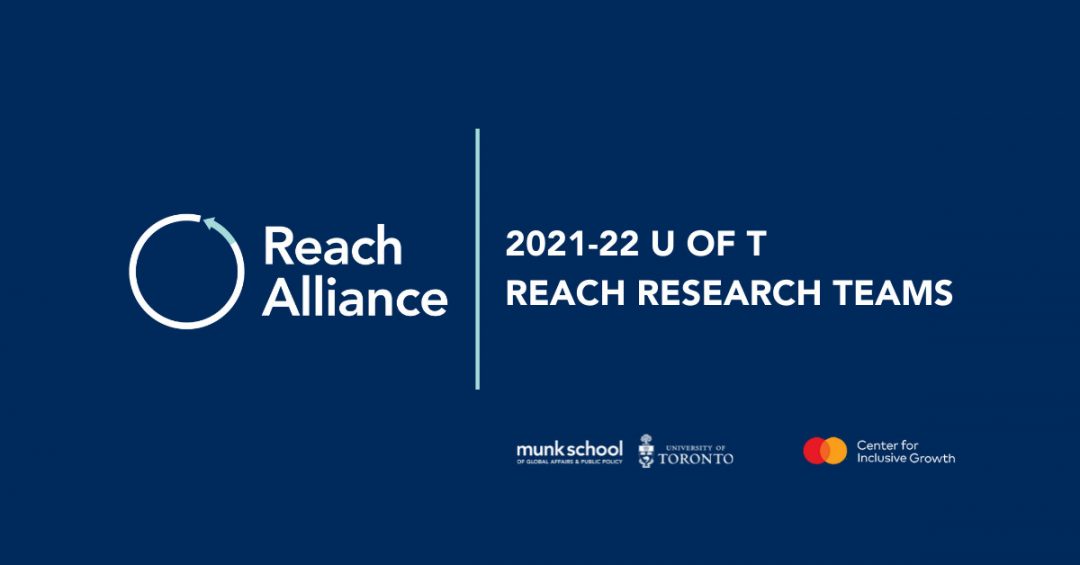
The Reach Alliance is thrilled to announce the formation of U of T’s 2021-22 Reach research teams, their faculty mentors, their team performance coaches, and their chosen case study interventions.
Over the last few months, thirty-two talented students from across the University of Toronto have been working to identify and pitch highly innovative interventions that have successfully reached hard-to-reach populations.
As a result, the Reach Alliance has selected seven inventive solutions—to be investigated by eight student-led, faculty-mentored research teams—in order to gain actionable insights on how to reach last-mile populations and to accelerate the achievement of the Sustainable Development Goals (SDGs) through local, community-based interventions.
This year’s U of T Reach research teams are particularly unique given the multidisciplinary and diverse range of student researchers, faculty mentors and coaches—and we are incredibly excited to see their research progress, outcomes and actionable insights that derive from their year-long journey of investigating local solutions to emerging global challenges.
Meet our eight U of T research teams who are investigating how to reach those hardest to reach
Dar Si Hamd: Harvesting Water from Fog
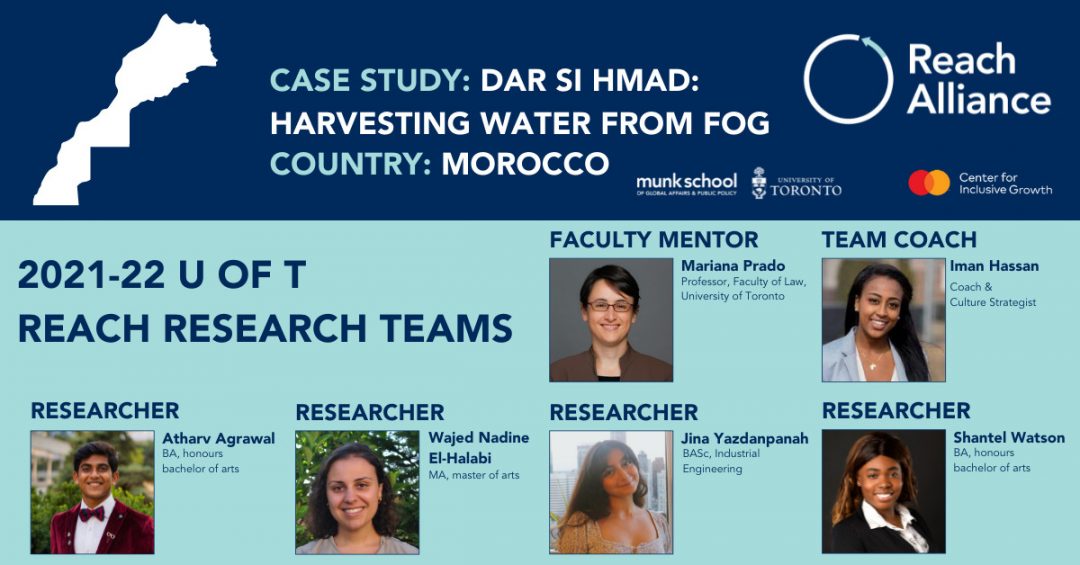
Researchers: Atharv Agrawal, Wajed Nadine El-Halabi, Jina Yazdanpanah, Shantel Watson
Faculty Mentor: Mariana Prado
Coach: Iman Hassan
About Dar Si Hmad: Harvesting Water from Fog: The Anti-Atlas mountains located in southwest Morocco is an extremely arid region with limited freshwater resources, a situation that has been aggravated by global climate change trends. This has posed a significant challenge to the Amazigh, an Indigenous population that has been historically marginalized throughout North Africa, who occupy these lands. In 2006, Dar Si Hmad (DSH), a local NGO, began to harvest fresh water from an abundant source that surrounded these mountains for most of the year: fog. This case study aims to examine how DSH has been able to achieve the sustainable community uptake and expansion of its fog collection and water management system.
Ornge Operation Remote Immunity
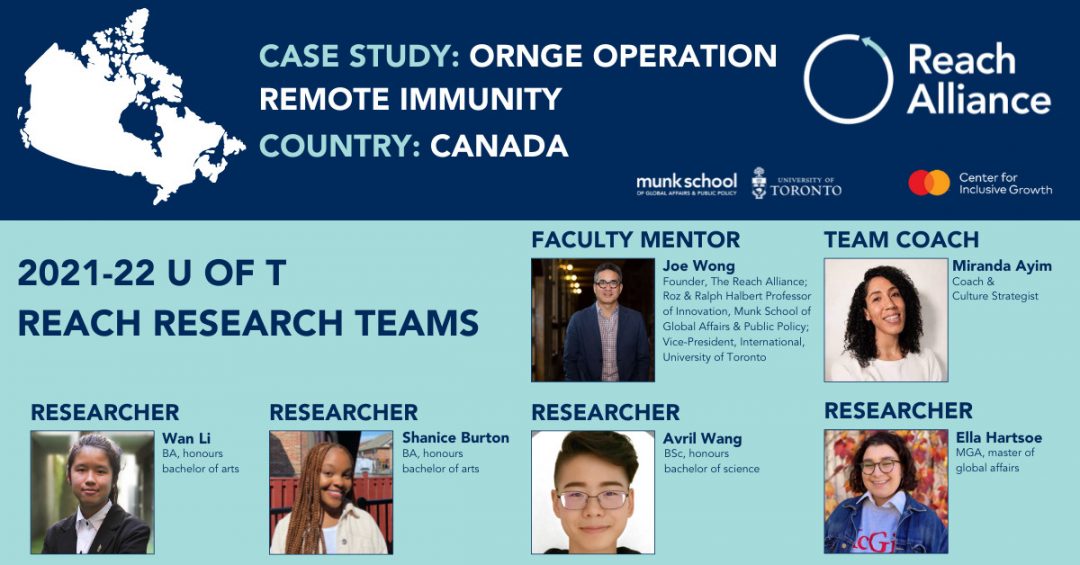
Researchers: Shanice Burton, Avril Wang, Ella Hartsoe, Wan Li
Faculty Mentor: Joe Wong
Coach: Miranda Ayim
About Ornge Operation Remote Immunity Case Study Intervention: As COVID-19 spreads across Canada, public health officials are tasked with distributing vaccines rapidly and equitably. Although establishing a high vaccination rate in Indigenous communities is essential to prevent outbreaks and reduce health inequality, challenges exist for both vaccine provision and uptake. In response, Ornge, a non-profit organization, and the Nishnawbe Aski Nation launched Operation Remote Immunity (ORI) to administer the Moderna COVID-19 vaccine to 31 fly-in communities in Northern Ontario. ORI sets a precedent for being a largely community-led vaccination program—and as a result, this case study aims to understand the critical role of community-based and centralized approaches to vaccine provision in reaching those hardest to reach.
The White Helmets and Personal Protective Equipment (PPE) Manufacturing

Researchers: Isabel Davis, Dario Toman, Carolina Canepari, Kristyn Lee,
Faculty Mentor: Stanley Zlotkin
Coach: Mike Alcorn
About The White Helmets and Personal Protective Equipment (PPE) Manufacturing Case Study Intervention: Years of civil war has left Syria’s healthcare system depreciated—lacking sufficient infrastructure and capacity, shortages of medical supplies and equipment, and difficulties with delivering PPE supplies needed to adequately respond to COVID-19—particularly in areas outside of Government control. In response and through, Syria’s first-ever PPE manufacturing center, the White Helmets (WHs) Manufacturing project produces and distributes PPE equipment to healthcare workers fighting against COVID-19 in Northwest Syria. This case study aims to provide insights into the role that local manufacturing interventions can play in responding to any humanitarian crisis.
Voice Post: Blue Messenger Bicycles
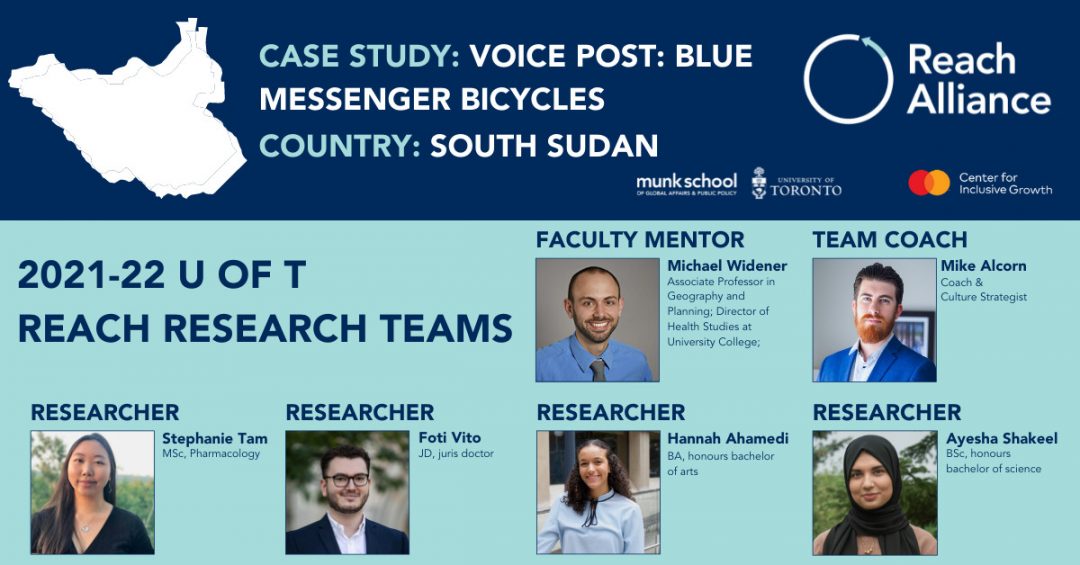
Researchers: Stephanie Tam, Foti Vito, Hannah Ahamedi, Ayesha Shakeel
Faculty Mentor: Michael Widener
Coach: Mike Alcorn
About Voice Post – Blue Messenger Bicycles Case Study Intervention: Recognizing that vulnerable communities in South Sudan have limited access to accurate and essential information, a group of young social innovators founded the Voice Post. Under the slogan “Information is Aid,” Voice Post aims to promote information sharing and community engagement through two main initiatives: Blue Messenger Bicycles (BMB) and information poles. Launched in 2020, BMB includes a team of 50 volunteers who travel around Juba with a blue bicycle, megaphone, battery, and GPS in order to broadcast life-saving information to citizens in five different languages: Arabic, Bari, Dinka, English, and Nuer. They disseminate information campaigns around public health, COVID-19, malaria, diarrhea, polio, food distribution, and messages of peace and reconciliation. By developing a better understanding of the factors contributing to Voice Post’s success in reaching the hardest to reach, this case study aims to create actionable insights for future scale-up initiatives and in delivering lifesaving information to where it is needed most.
Africaid Zvandiri
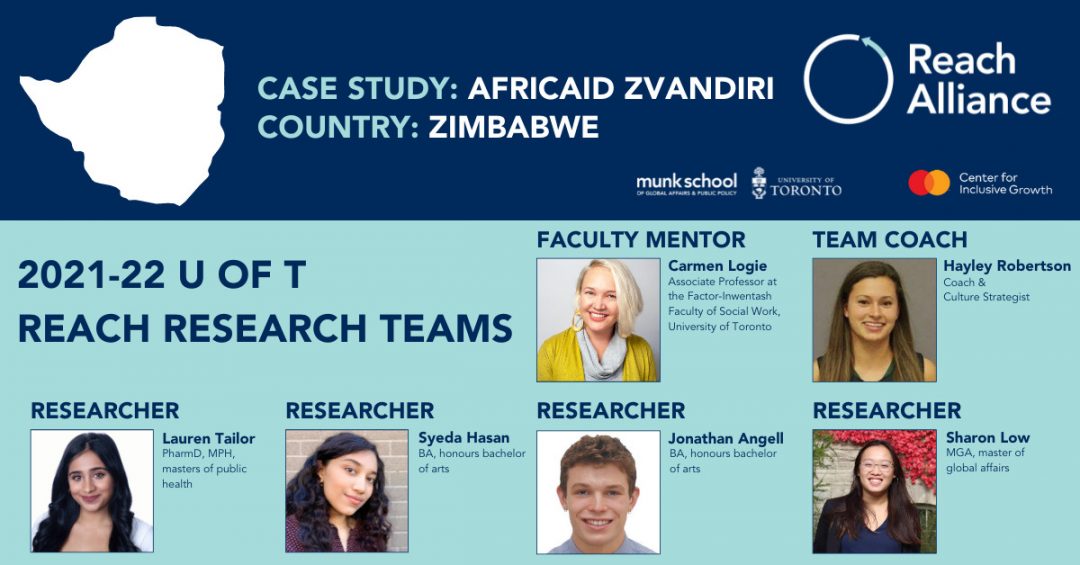
Researchers: Jonathan Angell, Lauren Tailor, Syeda Hasan, Sharon Low
Faculty Mentor: Carmen Logie
Coach: Hayley Robertson
About the Africaid Zvandiri Case Study Intervention: Children and adolescents living in Sub-Saharan Africa (SSA) are disproportionately vulnerable to human immunodeficiency virus (HIV). In 2020, SSA accounted for 67% of people living with HIV (PLHIV) globally but was home to 89% of the world’s youth (aged 10-19) living with HIV (YLHIV). In response, six HIV-positive youth created Zvandiri, a lifesaving peer-based non-profit program intended to improve HIV treatment adherence and prevention in children and adolescents that is managed by Africaid. Zvandiri began in Zimbabwe and has since expanded to nine African countries, supporting 56,000 young people. Its aim is to expand to 20 countries by 2030 and reach 1 million YLHIV. Thus, this case study aims to better understand Zvandiri’s scalability by identifying how its efficiency core models can be applied to different regions of SSA and outline the efficacy of different modalities that may be used to do so.
WaterAid Canada – Mali: Healthy Communities
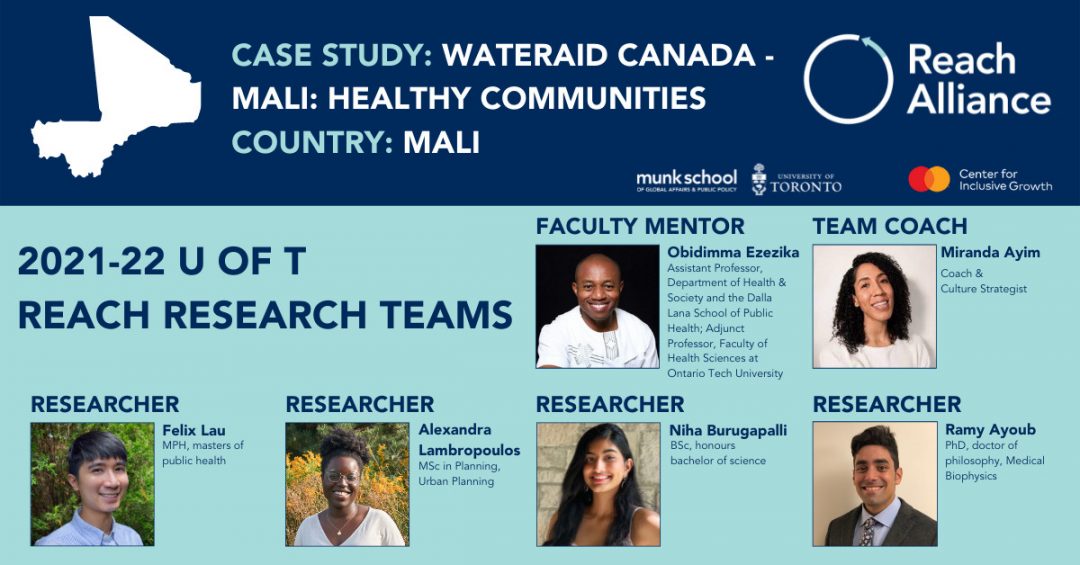
Researchers: Felix Lau, Alexandra Lambropoulos, Niha Burugapalli, Ramy Ayoub
Faculty Mentor: Obidimma Ezezika
Coach: Miranda Ayim
About WaterAid Canada Case Study Intervention: Mali is one of the poorest countries in the world, with nationally low levels of access to safe drinking water and sanitation. Communities living in rural areas in Mali rely on unsafe water for survival, a reliance that often results in further illness or death. WaterAid Canada found that over 4000 children die each year from inadequate water, sanitation and hygiene. With half the population of Mali living significantly below the poverty line, the Mali government lacks the finances and resources to adequately address these issues. In response, WaterAid Canada Mali: Healthy Communities (MHC) was implemented to provide access to safe water and sanitation infrastructure for communities with previous access only to traditional, contaminated wells, engage community members in promoting hygiene and healthy behaviour practices through arts/education and water-related economic activities.
Digital Green
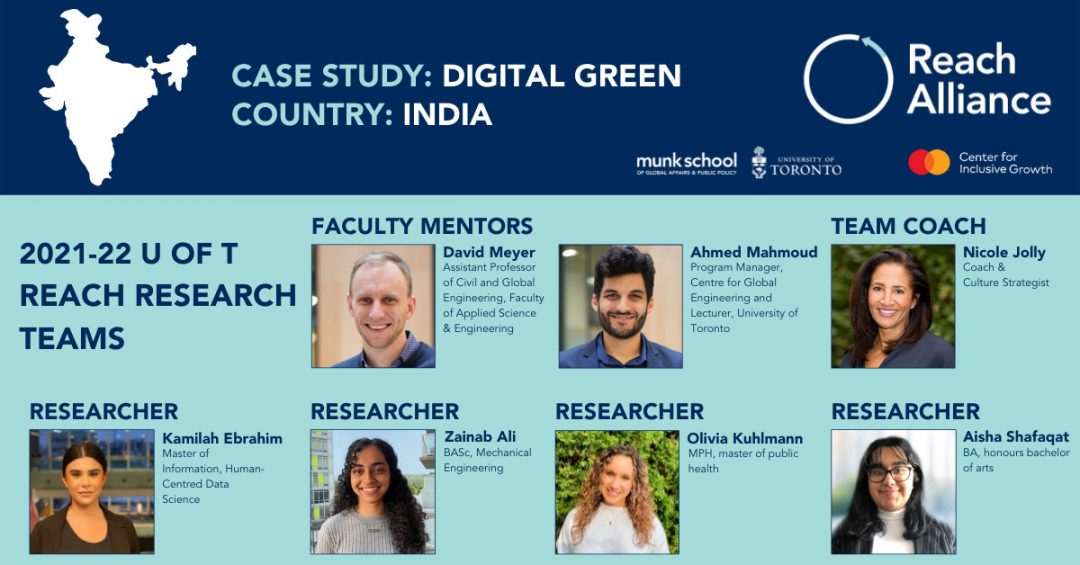
Researchers: Kamilah Ebrahim, Zainab Ali, Aisha Shafaqat, Olivia Kuhlmann
Faculty Mentor: David Meyer and Ahmed Mahmoud
Coach: Nicole Jolly
About Digital Green Case Study Intervention: With over 22 languages, 415 dialects and a diverse ecosystem, barriers to traditional agricultural extension programs in India include a lack of industry experts, language challenges, insufficient awareness of multiple indigenous crops and geographical limitations, which exacerbates the cost of agricultural extension projects. In response, Digital Green empowers farmers to improve their productivity, food security and livelihoods by leveraging the power of technology and grassroots partnerships to reach out to traditionally marginalized groups. Their hub-and-spoke approach focuses on the assessment of local systems to understand the needs of rural farmers, the co-creation of localized video content considering linguistic, socio-cultural and agro-ecological context and community building leveraging existing local partners and social groups to facilitate video dissemination. Digital Green’s intended outcome is to help bring smaller scale farmers’ goods to market, thereby reducing transportation costs, indirect costs and increasing access and financial revenue.
Small Family Businesses in Tequila, Mexico
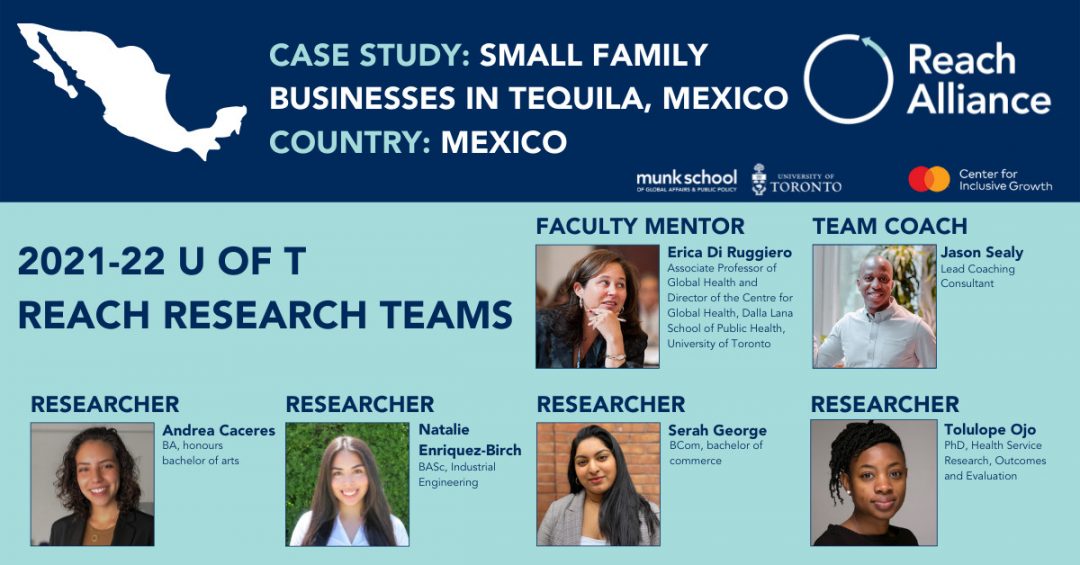
Researchers: Andrea Caceres, Natalie Enriquez-Birch, Serah George, Tolulope Ojo
Faculty Mentor: Erica Di Ruggiero
Coach: Jason Sealy
About the Small Family Businesses in Tequila, Mexico Case Study Intervention: In collaboration with ITESO, this case study aims to understand the extent to which family business models contribute to business sustainability practices and how it may strengthen the market position of local artisanal businesses in Tequila.
